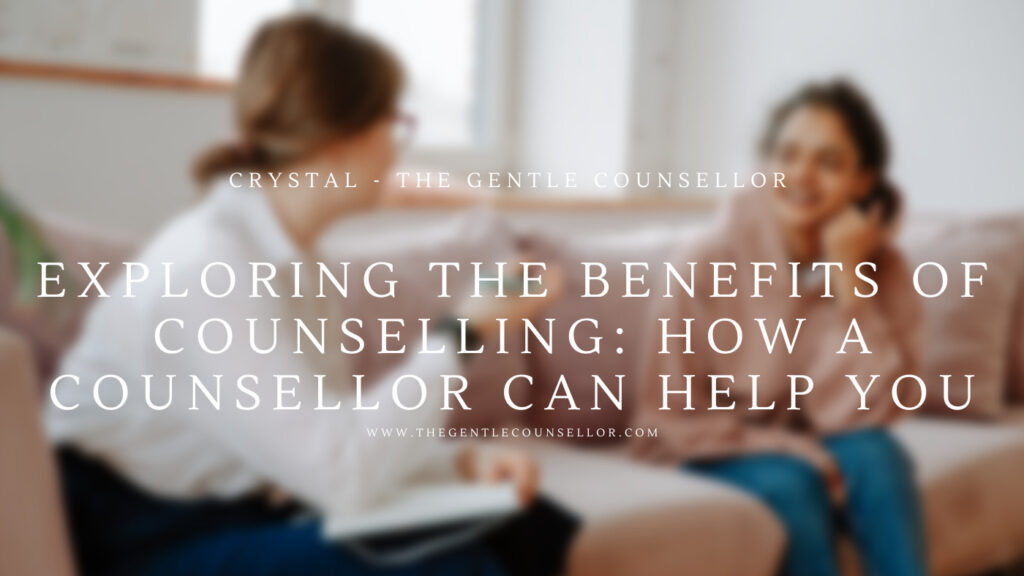
Exploring the Benefits of Counselling: How a Counsellor Can Help You
This blog post explores the various ways a counsellor can help individuals with emotional and mental health issues. Learn how to choose the right counsellor and the benefits of seeking counselling for anxiety, depression, trauma, addiction, grief, self-esteem, and burnout.
Counsellors are trained professionals who are equipped with the skills and knowledge to help individuals deal with a wide range of emotional and mental health issues. If you're struggling with any sort of emotional distress or simply need someone to talk to, a counsellor can be an invaluable resource. In this article, we'll explore some of the ways that a counsellor can help, and what you should look for in a good counsellor.
What is counselling?
Counselling is a form of talking therapy that involves working with a trained professional to explore and work through personal issues. Counsellors provide a safe and confidential space for individuals to discuss their concerns, explore their emotions, and develop strategies to cope with and overcome difficulties.
Counselling is often used to address specific mental health issues, such as anxiety, depression, trauma, and addiction. It can also be used as a preventative measure to help individuals manage stress, improve relationships, and develop a better sense of self-awareness.
What can a counsellor help with?
Counsellors can help with a wide range of issues, including:
- Anxiety and depression - Counsellors can provide support and guidance for individuals dealing with anxiety and depression. They can help clients develop coping strategies, manage their symptoms, and work towards long-term recovery.
- Relationship issues - Whether it's dealing with conflict, communication issues, or trust problems, a counsellor can help couples and individuals navigate the challenges of relationships. They can provide a safe and neutral space to discuss problems, explore feelings, and develop strategies to improve communication and strengthen relationships.
- Trauma and PTSD - Counsellors can help individuals who have experienced trauma, abuse, or other traumatic events. They can provide support and guidance for coping with the emotional and psychological effects of trauma, and work towards healing and recovery.
- Addiction - Counsellors can help individuals dealing with addiction to substances or behaviours. They can provide support, guidance, and accountability as clients work towards recovery and sobriety.
- Grief and loss - Losing a loved one can be an incredibly difficult and painful experience. A counsellor can provide support and guidance for individuals dealing with grief and loss, helping them to work through their emotions and develop strategies for coping with their loss.
- Self-esteem and self-worth - Counsellors can help individuals develop a stronger sense of self-worth and self-esteem. They can work with clients to explore their values, beliefs, and goals, and develop strategies for building self-confidence and self-esteem.
- Stress and burnout - Counsellors can provide support and guidance for individuals dealing with stress and burnout. They can help clients develop coping strategies, manage their workload, and work towards a healthier work-life balance.
What to look for in a counsellor
When choosing a counsellor, it's important to look for someone who is trained, experienced, and has a good reputation. Here are some things to consider:
- Qualifications - Look for a counsellor who is qualified and registered with a professional body. This will ensure that they have the necessary training and experience to provide effective counselling.
- Experience - Consider a counsellor's experience in working with individuals who have similar concerns to your own. Ask about their approach and how they work with clients.
- Availability - Consider a counsellor's availability and location. It's important to find someone who can accommodate your schedule and is located in a convenient location.
- Personality - It's important to find a counsellor who you feel comfortable talking to and who you trust. Consider their personality and approach, and whether it aligns with your own values and beliefs.
- Fees - Consider a counsellor's fees and whether they are covered by
your health insurance or whether they offer a sliding scale or payment plan. It's important to find a counsellor whose fees are within your budget.
- Reviews - Look for reviews or testimonials from previous clients. This can give you an idea of their effectiveness and whether they are a good fit for you.
Conclusion
Counselling can be an effective way to address a wide range of emotional and mental health issues. By providing a safe and confidential space for individuals to explore their concerns, develop coping strategies, and work towards recovery and healing, counsellors can help individuals improve their quality of life and achieve their goals.
When choosing a counsellor, it's important to consider their qualifications, experience, availability, personality, and fees, as well as any reviews or testimonials from previous clients. By finding a counsellor who is a good fit for your needs and preferences, you can get the support and guidance you need to overcome your challenges and live a happier, healthier life.
Book a Counselling Session with Crystal
Crystal provides individual and couple counselling. She specialises in Trauma, Attachment Theory, Perinatal Mental Health and Parenting Support. You can be supported in processing your trauma in a safe space to be seen and heard. Maybe you'd like to feel calmer and less triggered in your parenting, not worry so much about what others think of you, find more balance in meeting your own needs, figure out better communication skills, or just need someone to talk with who 'gets it'.